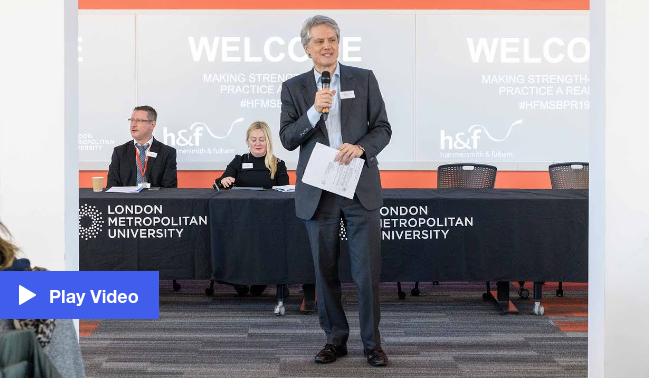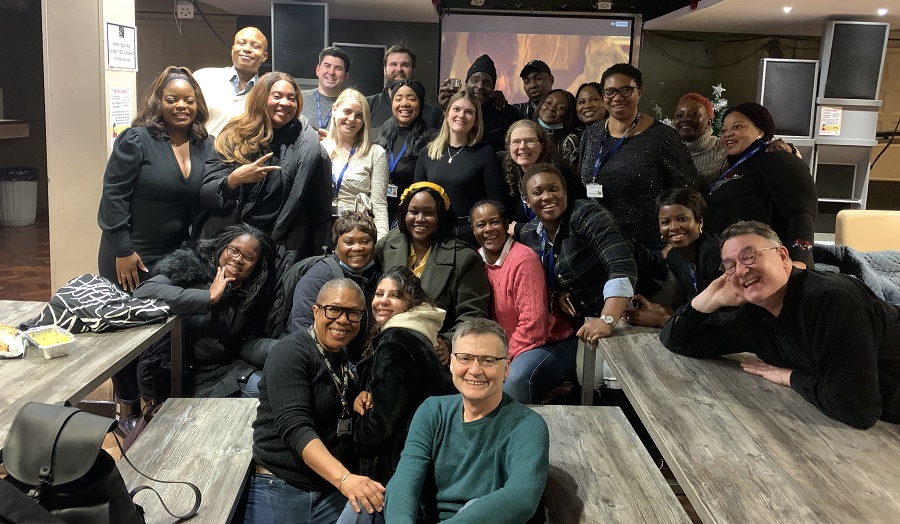Apply for this course
Please select when you would like to start:
If you're a UK applicant wanting to study full-time starting in September, you must apply via UCAS unless otherwise specified. If you're an international applicant wanting to study full-time, you can choose to apply via UCAS or directly to the University.
If you're applying for part-time study, you should apply directly to the University. If you require a Student visa, please be aware that you will not be able to study as a part-time student at undergraduate level.
Apply to us for September 2025
If you're a UK student or an EU student with settled or pre-settled status applying for September 2025, you can simply call our hotline on 0800 032 4441 or complete our fast-track online application form.
Why study this course?
Our Social Work (including foundation year) BSc (Hons) is an alternative route into social work studies if you don’t meet the necessary requirements to enter the standard undergraduate degree.
On successful completion of the foundation year, you’ll be able to progress onto the Social Work BSc (Hons) three-year course. Or you may decide to progress onto another one of our social and healthcare courses.
Our social work courses are also ranked eighth in the UK for course satisfaction according to the Guardian University Guide.
Third in London for student satisfaction
Our social work courses are ranked third in London for overall student satisfaction in the Complete University Guide 2025
Eighth in the UK for course satisfaction
Our social work courses are ranked eighth in the UK for course satisfaction according to the Guardian University Guide
Learn the skills you need to reach your full potential
This four-year degree course includes an intensive foundation year (Year 0) which will provide you with the skills required for your subsequent three years of study
Course modules
The modules listed below are for the academic year 2025/26 and represent the course modules at this time. Modules and module details (including, but not limited to, location and time) are subject to change over time.
Year* 0 modules
Year 1 modules
Year 2 modules
Year 3 modules
Foundation Year Programme
This module currently runs:all year (September start) - Monday morning
all year (September start) - Monday afternoon
all year (September start) - Tuesday morning
all year (September start) - Tuesday afternoon
all year (September start) - Wednesday morning
all year (September start) - Wednesday afternoon
all year (September start) - Thursday morning
(core, 120 credits)
In this module you will explore a broad range of social science and current affairs issues. You’ll reflect on the qualities needed to be a successful student in Higher Education and identify your own strengths and areas for development. You’ll be guided to investigate and conduct research on a topic of interest to you in greater depth.
1. You will learn to access sources, recognise and analyse arguments, and critically engage with source material.
2. You will explore some principles of research and develop research skills.
3. You will develop digital and academic communication skills, including integrating source materials with your own voice into written work.
4. You will develop oral, written and visual communication skills to produce work in a range of formats.
5. You will critically engage with current, social, and ethical issues, in the context of the Education for Social Justice Framework and your subject area
6. You will contribute to building a sense of belonging, and a respectful learning community, where students collaborate, share knowledge and ideas and work effectively as a team.
7. You will be encouraged to explore and build on prior knowledge and experiences to prepare you for further study in your subject area, professional behaviours and your chosen career
8. You will reflect on your learning journey, build your confidence, and take ownership of your motivation.
Assessing, Planning and Professional Ethics
This module currently runs:all year (September start) - Monday morning
(core, 30 credits)
This module provides opportunities for students to prepare for effective social work practice. By the end of this module:
- You will understand key concepts and to develop a foundational knowledge of need, risk, support and care for children and adults, and the role of the social worker and other related professional fields such as housing
- You will be able to recognise how legislation, policy and practice guidance relates to assessment and support/care planning.
- You will be able to understand and reflect on models and theories of assessment and support/care planning for children and adults and to develop practitioner skills in a context of social work ethics and values.
- You will recognise the importance of promoting the involvement of children and adults in social work processes and the development of skills in the empowerment of service users.
Lifespan Development
This module currently runs:all year (September start) - Monday afternoon
(core, 30 credits)
Social Workers are required to develop and apply relevant knowledge from social work practice and research, social sciences, law, other professional and relevant fields, and from the experience of people who use services (PCF Domain 5).
This module will support you to apply knowledge acquired from sociological and psychological theories of adult and child development, people with lived experience and through a child observation task
By the end of this module you will be able to
- Identify, analyse and evaluate psychological and sociological theories of child and adult development.
- Demonstrate an understanding of child developmental milestones within the parameters of diverse cultures and contexts.
- Explain and analyse theories of adult development, to understand the specific, day to day difficulties and disadvantages faced by different adult service user groups including people who need the help and support of social care services because of ill-health, impairment/disability.
- Identify housing challenges and solutions throughout the life course including: the impact of poor housing on children; intergenerational fairness in access to housing; and housing options and support for older people
- Explain theories of loss and grief and identify differing models of support within the context of anti-oppressive and anti-discriminatory theory and practice.
- Apply psychological and sociological theories of development to a child observation and an adult narrative task.
People with Lived Experience colleagues have contributed to the development, design and delivery of this module in the following ways:
Facilitation of Task 2 narrative and facilitation of teaching sessions to support this task. Facilitation of lifespan development teaching session exploring disability.
Read full detailsReadiness for Direct Practice
This module currently runs:all year (September start) - Thursday afternoon
(core, 30 credits)
This year-long module prepares you for direct practice to progress into your first placement.
This module provides opportunities for you to:
• Gain a deeper understanding of the role of social workers, the regulations and key
documents that govern social workers.
• Develop practice skills in a supportive learning environment.
• Develop professional abilities, skills and understanding of the generic role of a social
worker to achieve readiness for practice across a range of different service user
groups.
• Develop basic communication skills in-line with the Readiness for Practice criteria.
• Engage with the 9 domains of the Professional Capabilities Framework (PCF).
People with Lived Experience colleagues have contributed to the development, design and delivery of this module in the following ways:
- Developed the case studies used in the role play assignment
- Assess the role play assignment
- Co-facilitate a session
Read full detailsSocial Context for Social Work
This module currently runs:all year (September start) - Thursday morning
(core, 30 credits)
This module introduces social theories, social constructs, and social policy whereby legislation, ethical issues, anti-discriminatory and anti-oppressive practice and Law are embedded throughout the module.
Through the examination of the nine protected Characteristics under the Equality Act 2010, you will address structural issues that impact on the lives of People with Lived Experience.
You will explore and reflect on Global, National and Local issues and how these issues manifest into other social issues, such as homelessness, domestic violence, poverty, education, unemployment etc. (L01)
You will have direct input from People with Lived Experiences and social workers with regards to their lived personal and professional experiences of social issues.
You will scrutinise and analyse, ethical dilemmas and the tensions that exist between Law, legislation, policy and procedures and practice.
Aims
You will gain knowledge and understanding of housing Law and how it interconnects with social work practices.
You will be expected to undertake research in preparation for planning for a group presentation in order to develop your communication skills through collaboratively working within groups, which is a fundamental skill within social work. (LO4)
You will acquire knowledge from different sociological perspectives, social policy, human rights and Law. (LO1)
You will be encouraged to explore and question personal values and beliefs systems and investigate how this impacts and influences social work practice. (LO3)
You will have the opportunity
‘People with Lived Experience colleagues have contributed to the development, design and delivery of this module in the following ways
- Developed the case studies used
- Co-facilitated a session
- Marked the presentations’ etc
Creative, critical reflective approaches to practice
This module currently runs:spring semester - Wednesday afternoon
(core, 15 credits)
This module will help you consider the ways that Social Workers, Youth and Community Workers can be creative in the use of ‘self’, reflection and in exploring imaginative new ways of working with people. You explore and learn about a range of creative approaches to enable the development of critical reflective dialogue and support individuals, groups and communities to analyse their circumstances and that issues affecting them, and to search for possible solutions that support growth and change.
Social Workers, Youth and Community Workers who work alongside marginalised individuals, families and communities are required to make difficult decisions and to intervene to support change and improve the circumstances of people’s lives. The social professions require professionals who have a high level of personal commitment, are open-minded and prepared to examine and even change their own attitudes and possible prejudices.
Each encounter with a vulnerable individual, family or community is unique and requires creative thinking about solutions that are specific to that individual, family or community. Ultimately a social professional’s creativity is motivated by and directed to understanding and improving the lives and conditions of marginalised people within society who are in need of support, advocacy and protection. Networking, supporting and championing new ways of meeting need are all creative endeavours, as is the ability to reflect both personally and with others.
Module aims:
- You will develop an understanding of concepts and underlying principles in fostering critical and reflective dialogue
- You will be able to use a range of creative approaches to support individuals, groups and communities to analyse their circumstances and explore potential solutions to issues affecting their lives.
- You will learn how to gather and use the feedback and insights of others to critically reflect on and further develop your own practice.
- You will develop a critical understanding of power and structural oppression and how this understanding can be used to challenge and disrupt inequality in practice
Law for Social Work Practice
This module currently runs:all year (September start) - Wednesday morning
(core, 30 credits)
You will understand, analyse and critically reflect on legal processes, legislation, statutory instruments, and guidance. You will explore social work and multi-agency practice interventions applicable to children and adults in need and at risk of harm. You will examine how these are informed by law, theory, research and the voices of children and adults. Knowledge of inquiries and serious case reviews will inform your learning and concepts of human rights and safeguarding are central to the module. You will understand thresholds for intervention and the application of professional judgement which underpin best-practice models.
The teaching methods are various and participatory. They take into account different learning needs and styles to ensure wide participation. You will be given tools to develop your confidence to interpret the and use law in social work practice in order to safeguard and protect People with Lived Experience. Your understanding of case law will be tested in this module.
The lectures and case studies in the seminars are guided by real life situations as reflected in practice in case law and as described in serious case reviews.
You will have the experience of observing live courts in action and take part in mock court activities (with the presentence of a judge and visiting lawyers). These activities serve to build on existing knowledge of the law and this will further expand your understanding of legislation and law in practice.
An ethical approach to applying the law runs through the whole course. You will learn about the legal system as a way of ensuring social justice, and you will learn how and why a rules-based order based on the European Convention of Human Rights informs all social work practice.
You will have the opportunity to make the connection with anti- discriminatory and anti-Oppressive practice and Equality of Opportunity. You will increase your understanding of the impact of past and present colonial approaches within the law and how a rights-based approach to law facilitates decolonisation in law and practice. The teaching group are experienced Practitioners and Academic staff representing diverse ethnicities, genders, sexualities, and cultures.
The aims of the module are that you will:
- learn how the English Courts and legal system works, and how to find your way through legislation, statutory instruments, codes of practice and case law.
- become familiar with key professional milestones, such as serious incident reports and professional guidance.
- have the opportunity to examine and explore laws related to anti- discriminatory practice, human rights and social justice in relation to current legislation, policy and practice guidance.
- have direct live experiences of courts in action, the use of real-life cases and the examination and explorations of serious case reviews.
- critically analyse the role of multi-agency working together in protecting children and adults, this will include housing law, and opportunities to explore safeguarding in practice for children and adults.
- critically reflect on the professional role with an emphasis on evaluating and managing risk, the importance of accountability, understanding thresholds and the application of professional judgement.
- investigate how the law evolved from a colonial context and how a rights-based approach to law facilitates decolonisation in law and practice.
Practice learning 1 - first placement
This module currently runs:all year (September start)
(core, 60 credits)
Practice Learning 1 will provide you with 70 days of experiential learning opportunities, within a social work or social care setting, to integrate the theory you have been introduced to in university with practice. You will be supported to develop and submit key tasks required to progress to your 1st placement.
You will also be supported to demonstrate appropriate professional behaviour and relationships, develop professional values and gain working knowledge of organisational contexts. It also aims to provide you with the opportunity to apply the knowledge and skills required for practice with individuals, families, carers, groups and communities.
It provides the first opportunity for you to practise social work under supervised conditions and develop knowledge, skills and values to enable you to meet the Professional Capabilities Framework (PCF) at first placement level and Social Work England’s Professional Standards as they relate to this level of your studies.
Read full detailsTheoretical Perspectives in Social Work
This module currently runs:autumn semester - Wednesday afternoon
(core, 15 credits)
This module provides opportunities for students to understand and apply theoretical perspectives that support and structure social work intervention and direct work with children and adults. By the end of this module:
- You will be able to understand and analyse the contested nature of social work explanations of the circumstances of service users and the interventions implied by these explanations.
- You will be able to identify and analyse theoretical perspectives relevant to social work taking into account the practical and ethical impact these perspectives have upon different individuals, groups and communities.
- You will be able to evaluate different theoretical perspectives with regard to relations of power and anti-oppressive practice relevant to social work
Becoming Research Minded for Practice
This module currently runs:all year (September start) - Thursday afternoon
(core, 30 credits)
To be research minded is to have the ability to use research to inform practice which counters unfair discrimination, racism, poverty, disadvantage and injustice - consistent with core social work values. This core module enables you to re-visit your teaching and learning on your course and will explore a range of different attributes to develop critical understandings of the application to social work research. This will include:
● An awareness of the value of research
● The ability to identify or generate appropriate sources of evidence
● An appreciation of different methods used to obtain and make sense of research knowledges
It requires you to complete a substantive student led piece of work. You will have scope to develop your critical analytical skills, engage with research processes and explore relevant subjects of personal and professional interest with a view to consolidating transferable skills for future employment.
Read full detailsPractice learning 2 - second placement
This module currently runs:all year (September start)
(core, 75 credits)
The Practice Learning 2 module provides you with the opportunity to prepare for your professional practice in social work under supervised conditions and
• Develop your knowledge, values and skills in relation to working with people with lived experience in more complex situations, taking responsibility for managing your time and workload effectively.
• Develop an understanding of, and an ability to apply ethical principles and relevant legislation whilst working alongside professionally qualified social workers in a setting and with a people with lived experience group that contrasts with the first placement.
• Consolidate and integrate the skills and knowledge developed in your first placement and university-based teaching modules.
• Demonstrate knowledge and effective application of the Professional Capabilities Framework (PCF) (BASW), Professional Standards (SWE) and the Knowledge and Skills Statement (KSS) (DfE and DoH)
By the end of your final placement, you are expected to be practising at the level that will be required of a newly qualified social worker.
Read full detailsHomelessness and Housing Policy
This module currently runs:autumn semester - Thursday morning
autumn semester - Thursday morning
(option, 15 credits)
In this module, you will look at one of the most pressing social issues in the UK today – that of the cost and shortage of housing and of the shortage of affordable housing in particular. Living in a safe, comfortable and secure home is a human right, essential to our wellbeing. However, it is widely agreed that we have a housing crisis in the UK. This crisis is perhaps especially acute in London but it is a crisis which affects much of the country. Over the past ten years, the cost of housing, including rents in the private rented sector have spiralled while the number of social rented homes has continued to fall and the numbers of people who are homeless or living in temporary accommodation has risen. In this module, you will look at the scale and at the underlying causes of the housing crisis in the UK. You will look at the shortage of affordable housing, the growth of the private rented sector and at the collapse of social rented housing. You will also look at how access to housing and the housing market reflects wider social divisions in terms of class, ethnicity and gender. The module places housing and housing policy at the core of our understanding of society, social divisions and social policy.
The module focuses on housing policy and on social housing, looking at the history of social housing in the UK and at changes in housing policy since the 1980s. The module also looks at the growth of homelessness and at the underlying causes of the growing level of homelessness. You will look at homelessness policy, at good practice models of how to tackle homelessness and at the link between housing and poverty and the importance of both housing and welfare policy as instruments of poverty reduction.
The aims of the module are to:
- understand what the housing market is and how it works
- develop an understanding of the problems in accessing decent housing in the UK, how widespread the problems are, which groups suffer most and why these problems appear to have worsened over recent years
- develop data handling and data analysis skills to collect and analyse relevant data on housing and the housing crisis in the UK
- develop and demonstrate an understanding of housing policy and housing policy changes in the UK
- develop policy analysis and policy evaluation skills
- understand how the housing market reflects the different economic and political ideologies which shape housing policy
Housing Issues and Housing Solutions
This module currently runs:spring semester - Thursday morning
(option, 15 credits)
Housing Issues and Housing Solutions outlines the key issues that face people working in housing, residents and community workers. It will focus on a practical approach to dealing with community-related & housing issues, their causes and solutions. It will examine the rights and obligations of residents and identify good practice in key management areas such as resident involvement, dealing with anti-social behaviour and disrepair. Combined with other modules in the faculty, such as ‘Housing and Homelessness’, this module provides a housing pathway for students wishing to develop or further their careers in this area.
The module aims to:
- Place changes in housing management in the context of wider social, economic and organisational changes; (A01)
- Introduce the key practical issues facing housing professionals, and good practice in addressing these issues; (A02)
- Identify ways in which housing service users and community workers can challenge poor performance and get involved in service improvement; (A03)
- Examine the benefits and challenges of partnership working in dealing with housing issues; (A04)
- Explain current discussions on the balance of rights and responsibilities for social housing tenants and other local residents. (A05)





.png)









-1.jpg)









